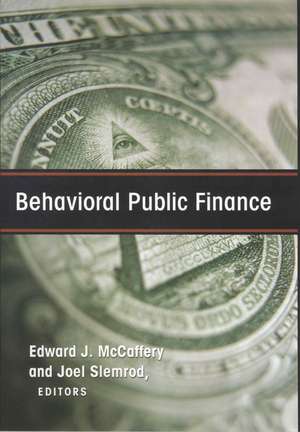Behavioral Public Finance
Editat de Edward J. McCaffery, Joel Slemroden Limba Engleză Hardback – 22 ian 2006
Behavioral economics questions the basic underpinnings of economic theory, showing that people often do not act consistently in their own self-interest when making economic decisions. While these findings have important theoretical implications, they also provide a new lens for examining public policies, such as taxation, public spending, and the provision of adequate pensions. How can people be encouraged to save adequately for retirement when evidence shows that they tend to spend their money as soon as they can? Would closer monitoring of income tax returns lead to more honest taxpayers or a more distrustful, uncooperative citizenry? Behavioral Public Finance, edited by Edward McCaffery and Joel Slemrod, applies the principles of behavioral economics to government's role in constructing economic and social policies of these kinds and suggests that programs crafted with rational participants in mind may require redesign. Behavioral Public Finance looks at several facets of economic life and asks how behavioral research can increase public welfare. Deborah A. Small, George Loewenstein, and Jeff Strnad note that public support for a tax often depends not only on who bears its burdens, but also on how the tax is framed. For example, people tend to prefer corporate taxes over sales taxes, even though the cost of both is eventually extracted from the consumer. James J. Choi, David Laibson, Brigitte C. Madrian, and Andrew Metrick assess the impact of several different features of 401(k) plans on employee savings behavior. They find that when employees are automatically enrolled in a retirement savings plan, they overwhelmingly accept the status quo and continue participating, while employees without automatic enrollment typically take over a year to join the saving plan. Behavioral Public Finance also looks at taxpayer compliance. While the classic economic model suggests that the low rate of IRS audits means far fewer people should voluntarily pay their taxes than actually do, John Cullis, Philip Jones, and Alan Lewis present new research showing that many people do not underreport their incomes even when the probability of getting caught is a mere one percent. Human beings are not always rational, utility-maximizing economic agents. Behavioral economics has shown how human behavior departs from the assumptions made by generations of economists. Now, Behavioral Public Finance brings the insights of behavioral economics to analysis of policies that affect us all.
Preț: 395.50 lei
Nou
Puncte Express: 593
Preț estimativ în valută:
75.73€ • 78.85$ • 62.83£
75.73€ • 78.85$ • 62.83£
Carte indisponibilă temporar
Doresc să fiu notificat când acest titlu va fi disponibil:
Se trimite...
Preluare comenzi: 021 569.72.76
Specificații
ISBN-13: 9780871545978
ISBN-10: 0871545977
Pagini: 411
Dimensiuni: 152 x 229 x 36 mm
Greutate: 0.75 kg
Ediția:New.
Editura: Russell Sage Foundation
Colecția Russell Sage Foundation
ISBN-10: 0871545977
Pagini: 411
Dimensiuni: 152 x 229 x 36 mm
Greutate: 0.75 kg
Ediția:New.
Editura: Russell Sage Foundation
Colecția Russell Sage Foundation
Notă biografică
EDWARD J. MCCAFFERY is Robert C. Packard Trustee Chair in Law and Political Science at the University of Southern California and visiting professor of law and economics at the California Institute of Technology. JOEL SLEMROD is Paul W. McCracken Collegiate Professor of Business Economics and Public Policy, director of the Office of Tax Policy Research in the Stephen M. Ross School of Business, and professor of economics at the University of Michigan. CONTRIBUTORS: Caroline Adams, Jonathan Baron, James J. Choi, Terrence Chorvat, John Cullis, Henk Elffers, Richard A. Epstein, Hanming Fang, Lee Anne Fennell, Bruno S. Frey, Howell E. Jackson, Philip Jones, David Laibson, Alan Lewis, George Loewenstein, Brigitte C. Madrian, Edward J. McCaffery, Andrew Metrick, Joel Slemrod, Dan Silverman, Deborah A. Small, Jeff Strnad, Alois Stutzer, and Paul Webley.
Cuprins
PART I PSYCHOLOGY, ECONOMICS, AND ECONOMETRICS 1 Chapter 1 Toward an Agenda for Behavioral Public Finance 3 Edward J. McCaffery and Joel Slemrod Chapter 2 Statistical, Identifiable, and Iconic Victims 32 George Loewenstein, Deborah A. Small, and Jeff Strnad Chapter 3 Distinguishing Between Cognitive Biases 47 Hanming Fang and Dan Silverman PART II BEHAVIOR AND POLICY 83 Chapter 4 Masking Redistribution (or Its Absence) 85 Jonathan Baron and Edward J. McCaffery Chapter 5 Mispredicting Utility and the Political Process 113 Bruno S. Frey and Alois Stutzer Chapter 6 Hyperopia in Public Finance 141 Lee Anne Fennell PART III TAX COMPLIANCE 173 Chapter 7 Value Added Tax Compliance 175 Paul Webley, Caroline Adams, and Henk Elffers Chapter 8 Trust and Taxation 206 Terrence Chorvat Chapter 9 Tax Evasion: Artful or Artless Dodging? 233 John Cullis, Philip Jones, and Alan Lewis PART IV RETIREMENT BEHAVIOR 259 Chapter 10 Accounting for Social Security Benefits 261 Howell E. Jackson Chapter 11 Saving for Retirement on the Path of Least Resistance 304 James J. Choi, David Laibson, Brigitte C. Madrian, and Andrew Metrick PART V RESERVATIONS 353 Chapter 12 Second-Order Rationality 355 Richard A. Epstein
